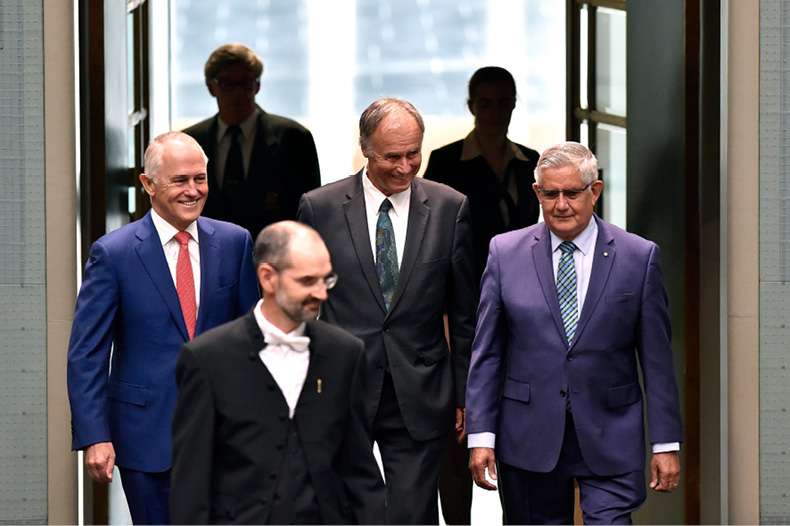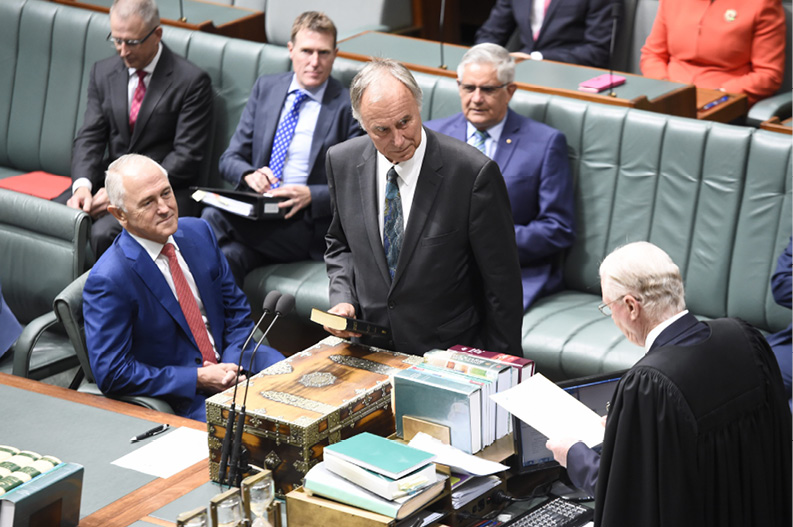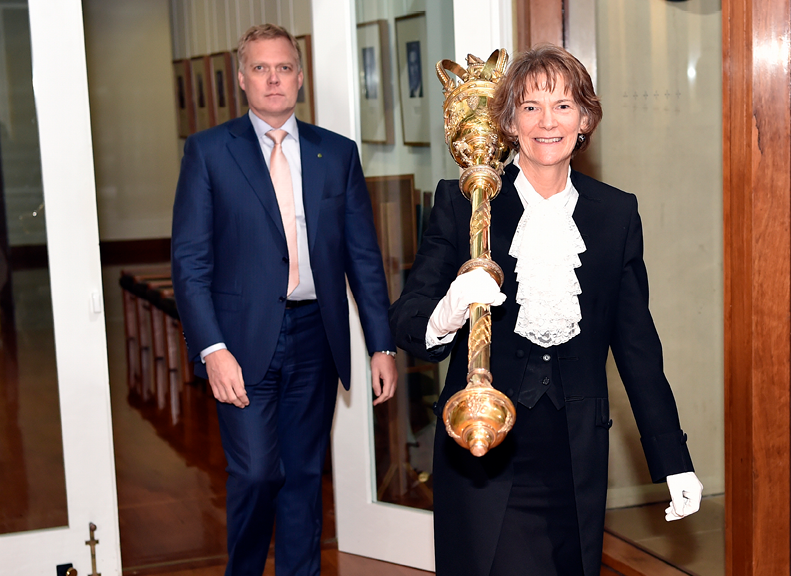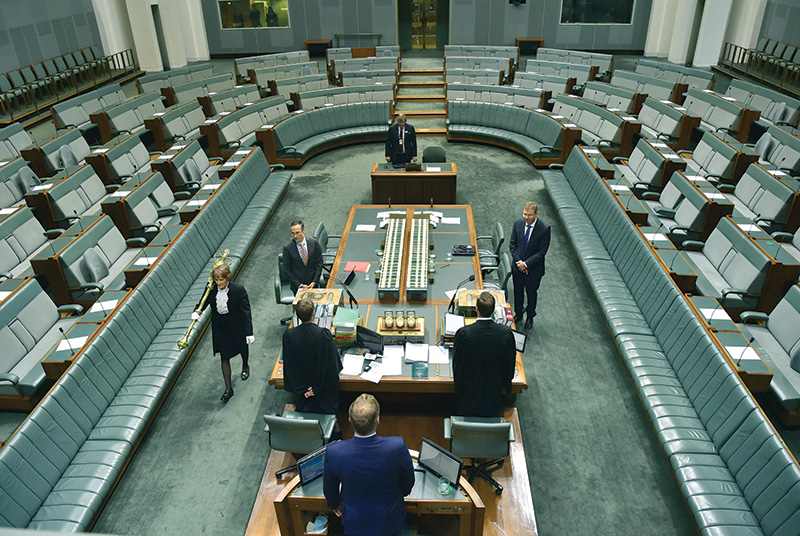Members’ and corporate support is provided by the Finance Office, the Parliamentary and Business Information Services Office, the People Strategies Office and the Serjeant-at-Arms’ Office, all of which report to the Serjeant-at-Arms. The offices liaise with the Department of Finance and DPS to provide comprehensive services to departmental staff as well as to members and their staff, including:
- facilitating committees’ private meetings, public hearings and site inspections
- advice and support on financial and human resource management, as well as records management, publishing and office services
- payment of members’ salaries and allowances
- organisation of members’ office accommodation, furniture and fittings
- provision of mail and courier services, and a booking service for committee rooms and chamber gallery seating
- maintenance and publication of key information about members and former members.
Expenditure on these services in 2017–18 was $8.237 million, which was $1.116 million below the budget allocation of $9.353 million. There were expenses of $2.924 million which did not require an appropriation; the budget allocation for these was $2.900 million. Results against performance criteria are summarised in the annual performance statement (page 23).
Dual citizenship
During 2017, under section 44 of the Constitution, the circumstances of members holding dual citizenship were called into question. Following resignations and judgments by the Court of Disputed Returns, seven by-elections were required. Three by-elections took place during the 2017–18 financial year. Following the endorsement of writs, returning or new members are required to make and subscribe an oath or affirmation of allegiance before being admitted to the House of Representatives and taking their seat in the Chamber.

The Serjeant-at-Arms, James Catchpole, admits the Prime Minister, the Hon Malcolm Turnbull MP, Mr John Alexander OAM and the Hon Ken Wyatt MP into the Chamber for the swearing-in of Mr Alexander. Image: David Foote, Auspic/DPS.

Mr John Alexander OAM making and subscribing the oath of allegiance. Image: David Foote, Auspic/DPS.

Retiring Serjeant-at-Arms, Lynne Eveston, escorting the Speaker from the Chamber. Image: David Foote, Auspic/DPS.

The House is adjourned: retiring Assistant Serjeant-at-Arms, Lynne Eveston, removes the Mace from the Table and escorts the Speaker from the Chamber. Images: David Foote, Auspic/DPS.
Performance summary
A high priority for the program area is to provide advice and support to the Speaker and the Speaker’s Office on the control and management of the precincts, chamber and gallery security, and ceremonial and other events at Parliament House. Staff work closely with colleagues in the Department of the Senate, the Department of the Prime Minister and Cabinet, the Australian Federal Police and DPS.
The ongoing program of building works to improve security at Parliament House was a particular area of focus during the year. In cooperation with colleagues from other agencies, staff implemented revised arrangements to support the operation of a temporary entrance to the House of Representatives wing; relocated members, their staff and departmental staff as needed to facilitate the works; and provided access for tradespeople and technicians to the House of Representatives wing and surrounds. Throughout these works, staff ensured that the House was still able to effectively meet and discharge its responsibilities.
Services and advice
Media services
The Serjeant-at-Arms and staff continued to work with the various media bureaus and the governing committee of the Federal Parliamentary Press Gallery to ensure compliance with the rules for media-related activity in Parliament House and its precincts.
During the year, the Serjeant-at-Arms, the Usher of the Black Rod and their delegates liaised closely with the press gallery to balance media access, security and parliamentary requirements on a daily basis and at major parliamentary events such as budget day.
The Presiding Officers approved special access to Parliament House for the TV series Secret City, which is a political thriller based on a book by Chris Uhlmann and Steve Lewis.
On a day-to-day level, the Serjeant-at-Arms and delegates work with members’ and ministers’ offices, representatives of the press gallery, the Australian Federal Police and the Parliamentary Security Service to ensure that media events in the precincts are conducted in compliance with the media rules and with minimum inconvenience to all. There were some breaches of the media rules whereby show-cause letters were issued to a number of media bureaus, resulting in sanctions being imposed against some members of the press gallery.
During the year, the Serjeant-at-Arms’ Office responded to around 120 requests to film or photograph in the private areas of the building.
Information services
As part of the department’s commitment to keep members and their staff informed about developments in the House, four editions of the members’ bulletin, House Update, were published, and seven procedural briefing sessions were held during the year.
Accommodation services
The Serjeant-at-Arms’ Office provides a concierge service for members. As part of that, it coordinates accommodation, capital works and routine maintenance services in the House of Representatives wing.
During the year, the office arranged 27 office relocations as a result of changes to the ministry and office-holder positions. That number is significantly lower than the 73 relocations in 2016–17 (which included many changes due to the general election). The Serjeant-at-Arms’ Office worked closely with the government and opposition whips to ensure that the relocations were completed quickly. The office also coordinated over 700 requests to supply and move furniture. That number is significantly higher than the previous year (600 requests), which reflects increased activity due to numerous members’ suites having their furniture replaced with new office furniture for staff, and security project works that have taken place in the House of Representatives wing. All tasks were performed within agreed timeframes, to agreed standards, and to the satisfaction of the whips and individual members.
Office furniture replacement project
The second phase of the furniture replacement project continued during 2017–18. As at 30 June 2018, 124 of the 125 suites had been completed, with only one suite outstanding. This suite is scheduled to be completed in the first two weeks of July 2018. Furniture has been ordered to meet requirements for the immediate future.
Maintenance, access and transport services
Requests for maintenance work in members’ suites are coordinated by the Serjeant-at-Arms’ Office, and include both emergency and routine work. During the year, the office coordinated 217 emergency requests, all of which were attended to promptly. In addition, the office coordinated 125 routine requests for repairs or alterations to suites or common areas. The office takes a proactive approach by performing office shutdowns and inspections over the autumn and winter recesses, so that issues can be identified, reported and addressed while parliament is not sitting.
The office coordinated 932 requests for assistance with telephone faults, relocations and allocations of telephone numbers (compared with 1,321 requests in 2016–17). The decrease reflects a regular sitting year (after the previous election year). Faults reported were referred to telephone support in DPS within five minutes of receipt, and appropriate timeframes for resolution were agreed with the affected areas.
As the area responsible for access to members’ suites, the office approved 962 requests by DPS for access to suites and general circulation areas for works related to general maintenance, services and projects. This is a small increase on the previous year (919 requests), reflecting a continued increase in project works in the House of Representatives wing.
The Serjeant-at-Arms’ Office operates a Transport Office that delivers a parliamentary shuttle service during sitting periods. The shuttle provides a readily available, secure car-with-driver service in Canberra for members. In 2017–18, the Transport Office managed some 7,800 bookings from members, compared with 9,390 bookings in 2016–17 (figures exclude unbooked shuttle trips from the House of Representatives entrance, and bookings accepted by COMCAR but serviced by the Transport Office). This represents a 17 per cent decrease in bookings on the previous year, in part reflecting a reduced number of sitting days in the period.
Parliament House security
The Serjeant-at-Arms represents the department on the Security Management Board. The board is established pursuant to section 65A of the Parliamentary Service Act 1999, to advise the Presiding Officers on security policy and the management of security measures for Parliament House. The board met seven times during the reporting period.
The department is also represented on three other security-related consultative groups, all chaired by the Australian Federal Police. The Incident Planning and Response Committee is attended by representatives of the parliamentary departments and several external agencies. It meets before meetings of the Security Management Board in order to provide specialist advice to the board. The Joint Management Group is attended by representatives of the parliamentary departments, the Department of Finance and the Australian Federal Police. This group meets weekly to consider security-related matters and coordinate responses at the operational level. The third group, the Emergency Management Group, was established in 2017–18 and is also attended by representatives of the parliamentary departments, the Department of Finance and the Australian Federal Police. The primary role of the Emergency Management Group is to develop, coordinate and facilitate security exercises at Parliament House, as determined and scheduled by the Incident Planning and Response Committee.
The department has established a business continuity network to coordinate contingency plans for work areas in the event of business disruptions. The department ran a desktop exercise in November 2017 for committee staff, to test their responses in the event that they had to unexpectedly operate off-site. Further exercises are planned for other areas of the department. An updated business continuity plan and business resumption plans were also completed and distributed to departmental staff during the year.
Security screening
Certain guests are exempt from security screening on entry to Parliament House. Approvals for any other exemptions are made jointly by the Serjeant-at-Arms and the Usher of the Black Rod. During the year, exemptions were approved for 21 groups and individuals (compared with 36 in 2016–17).
Information and communications technology
Under the revised information and communications technology (ICT) service-delivery framework, most of the department’s ICT functions are provided by DPS. In support of this arrangement, the department continued to participate in a range of ICT advisory and management committees. A revised memorandum of understanding and service-level agreement with the other parliamentary departments was signed on 6 June 2018.
The Joint Management Committee, which comprises senior parliamentary staff, oversees the service-level agreement; it met three times in the reporting period. The Serjeant-at-Arms is the department’s representative on the committee. The same senior parliamentary staff, meeting as the ICT Project Prioritisation Group, consider the priorities for DPS capital expenditure on replacing or upgrading parliamentary business systems.
Information services
During the year, the department in conjunction with DPS began a program of enhancement work to a number of ICT systems supporting the work of the House, parliamentary committees and its members. Requirements analysis was conducted for the upgrade or replacement of several key business systems, including:
- the Members Information Database (to be replaced by the new Parliamentarian Information Portal)
- CommDocs (a distribution portal for parliamentary committees)
- the e-petitions system
- the Parliamentary Procedural Records System (used to record and retrieve procedural events and precedents)
- the Parliamentary Relations Office database (used to support the international activities of the parliament).
The department continues to use its electronic document and records management system (EDRMS) to file and manage records electronically, and has been collaborating with the other parliamentary departments on a joint upgrade to reduce running costs. A project to identify methods of improving access to electronic records was initiated, and a solution is planned for implementation in 2018–19. The department is committed to meeting the targets under the National Archives’ Digital Continuity 2020 Policy by December 2020.
The department continued to support House of Representatives pages on the Parliament of Australia website, the consolidated intranet portal for senators and members, the portal for outgoing parliamentary delegations and the departmental intranet site. Several projects that are focused on improving the design and functionality of intranet and Parliament of Australia website pages commenced in May 2017, with expected completion in 2018–19.
Printing
The department’s in-house printing service was overhauled in 2017–18, with the replacement of print devices and software. New monochrome and colour print machinery was installed, as was new finishing and book-binding equipment. As a result of this investment, the House and committees can benefit from reduced completion times, and smaller, more cost-effective print runs. The service is now able to deliver a high-quality, responsive service for the parliament at reduced costs.
Parliamentary assistants program
The parliamentary assistants program is managed by the Serjeant-at-Arms’ Office. Parliamentary assistants are university students who perform the roles of messengerial attendants for an average of 10 hours per week with rosters planned around student commitments and the requirements of the House.
Six students took part in the program in 2017–18: two were existing assistants, and four were new appointments. The new assistants came from New South Wales, and all are studying at universities in Canberra.
Members’ salaries
All processing of members’ salaries and entitlements by the People Strategies Office was in accordance with legislation and administrative decisions. In the 2018 members’ survey, 95 per cent of members said that they were satisfied with support for salary payments. Annual expenditure on members’ salaries and other entitlements was $47.585 million.
Corporate support
The People Strategies Office provides corporate services and advice to the department. Operational performance indicators for finance, human resources and other corporate support services were met in 2017–18, and the department was in compliance with internal and external governance and reporting requirements.
Outlook
In 2018–19, the department will continue to provide advice and services of a high standard to support the Speaker, members in Parliament House and the department. In the course of the year the parliament is very likely to be prorogued and the House dissolved before a general election and the beginning of the Forty-sixth Parliament. This will be a busy period for the program area. It is anticipated that subsequent activity levels will be consistent with those that are normal during the first year of a parliamentary cycle.
It is anticipated that other priorities for the members’ and corporate support program during the year will include:
- supporting the completion of major capital works projects in the House of Representatives wing, including the re-opening of the House of Representatives entrance, and working with other agencies on upgraded technology for access to individual suites
- completing the second phase of the furniture replacement project
- in consultation with DPS, continuing to explore the proposed transfer of ownership of ‘Status B’ furniture to that department, including development of a draft memorandum of understanding and related service-level agreements
- planning for the hosting of a regional Serjeant-at-Arms conference at a suitable time after the next election, after a proposed larger international conference scheduled for July 2018 was postponed
- supporting the deployment of the new Parliamentarian Information Portal to replace the Members Information Database.